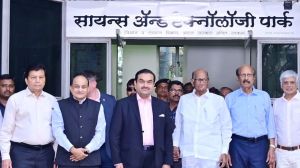From tea to lunch
Their engagement was sealed at that famous tea party hosted by matchmaker extraordinaire, Subramanian Swamy. Now with Congress leader Sha...

Their engagement was sealed at that famous tea party hosted by matchmaker extraordinaire, Subramanian Swamy. Now with Congress leader Sharad Pawar8217;s luncheon date with J. Jayalalitha on Wednesday, it looks as if the pre-nuptial ceremonies to mark the impending AIADMK-Congress marriage are already under way. It is, of course, a marriage of convenience. Given the peculiar polarities of Dravida politics, governed as it is by the immutable logic that one8217;s enemy8217;s enemy is one8217;s friend, there is very little room for manoeuvre. So when M. Karunanidhi and the DMK vaulted into the arms of the BJP-led coalition, it followed like night does day that the gates of 36, Poes Garden would, sooner than later, open to the Congress. Pawar put it so well after that well-publicised meeting: both of us need each other. Quite.
Whether the voters will perceive the ugly cynicism that marks such shotgun marriages and mete out suitable punishment, only time will tell. But cynical it certainly is. Look at the manner the Preventionof Terrorist Activities POTA Bill was handled. The DMK, which had actively championed the draconian Bill, suddenly withdrew it a few days ago, worried about alienating its Muslim voters further. The AIADMK, which had all along been shouting itself hoarse about the DMK8217;s poor handling of the law and order situation in the state, is now claiming the withdrawal of the Bill as its own victory. Jayalalitha8217;s recent warning to the Muslims of Tamil Nadu not to be taken in by the DMK8217;s attempts to mollify them is an early indication of her election strategy. The AIADMK general secretary, it seems, is poised to present herself as the guardian angel of secularism and of minority interests, never mind her famous defence of the Ayodhya campaign nearly seven years ago. Today, Pawar insists that the track record of Congress-AIADMK ties has been good. He conveniently forgets the anxious times Jayalalitha had given the Congress government that was in power at the Centre when she was the chief minister of Tamil Nadu in theearly 8217;90s and he also cleverly ignores the rough treatment that she had personally meted out to the Vajpayee coalition more recently.
In its anxiety to consolidate its electoral presence, the Congress finds it useful to gloss over all this evidence. In the process, it seems to have forgotten the old adage that those who forget their history are condemned to repeat it. Jayalalitha has by no means overcome the indiscretions of her past. Her cases still hang heavy on her. The compulsions that caused her to behave in an intemperate manner with her political partners in the past have by no means disappeared. There is, therefore, no cause to hope that she will conduct herself with more discretion and composure in the future. Even if the AIADMK-Congress alliance comes good in the short run, in terms of getting in the votes, in the long run the Congress may have to pay dearly for its lack of foresight. The BJP-led coalition found Jayalalitha8217;s suitcases a heavy burden. It8217;s unlikely that the Congress will fare anybetter in coping with them.
- 01
- 02
- 03
- 04
- 05































